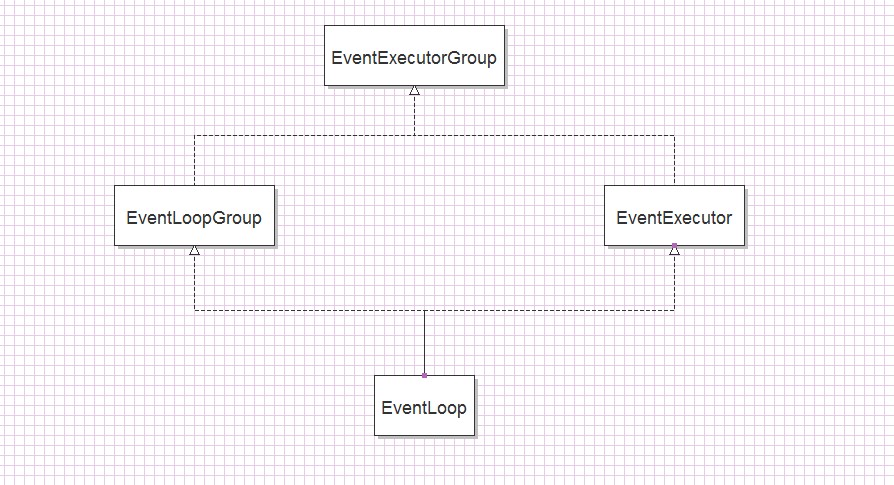Netty EventLoop与EventExecutor分析(1)
2013-05-14 10:21
155 查看

现在算是正式开始进入Netty的源码了吧,首先从事件循环的执行部分开始吧,上图就是顶层的几个接口之间的关系,首先我们来看最上层的EventExecutorGrouppublic interface EventExecutorGroup extends ScheduledExecutorService, Iterable<EventExecutor> {
/**
* Returns {@code true} if and only if this executor was started to be
* {@linkplain #shutdownGracefully() shut down gracefuclly} or was {@linkplain #isShutdown() shut down}.
*/
boolean isShuttingDown(); //
/**
* Shortcut method for {@link #shutdownGracefully(long, long, TimeUnit)} with sensible default values.
*/
void shutdownGracefully();
/**
* Signals this executor that the caller wants the executor to be shut down. Once this method is called,
* {@link #isShuttingDown()} starts to return {@code true}, and the executor prepares to shut itself down.
* Unlike {@link #shutdown()}, graceful shutdown ensures that no tasks are submitted for <i>'the quiet period'</i>
* (usually a couple seconds) before it shuts itself down. If a task is submitted during the quiet period,
* it is guaranteed to be accepted and the quiet period will start over.
*
* @param quietPeriod the quiet period as described in the documentation
* @param timeout the maximum amount of time to wait until the executor is {@linkplain #shutdown()}
* regardless if a task was submitted during the quiet period
* @param unit the unit of {@code quietPeriod} and {@code timeout}
*/
void shutdownGracefully(long quietPeriod, long timeout, TimeUnit unit);
/**
* @deprecated {@link #shutdownGracefully(long, long, TimeUnit)} or {@link #shutdownGracefully()} instead.
*/
@Override
@Deprecated
void shutdown();
/**
* @deprecated {@link #shutdownGracefully(long, long, TimeUnit)} or {@link #shutdownGracefully()} instead.
*/
@Override
@Deprecated
List<Runnable> shutdownNow();
/**
* Returns one of the {@link EventExecutor}s that belong to this group.
*/
EventExecutor next();
/**
* Returns a read-only {@link Iterator} over all {@link EventExecutor}, which are handled by this
* {@link EventExecutorGroup} at the time of invoke this method.
*/
@Override
Iterator<EventExecutor> iterator();
@Override
Future<?> submit(Runnable task);
@Override
<T> Future<T> submit(Runnable task, T result);
@Override
<T> Future<T> submit(Callable<T> task);
@Override
ScheduledFuture<?> schedule(Runnable command, long delay, TimeUnit unit);
@Override
<V> ScheduledFuture<V> schedule(Callable<V> callable, long delay, TimeUnit unit);
@Override
ScheduledFuture<?> scheduleAtFixedRate(Runnable command, long initialDelay, long period, TimeUnit unit);
@Override
ScheduledFuture<?> scheduleWithFixedDelay(Runnable command, long initialDelay, long delay, TimeUnit unit);
}
这个接口定义的相对来说还是很简单的,因为一看就基本能看明白每个方法的作用,首先它继承了ScheduleEcecutorService ,因此可以把它看成是一个Task的执行器,另外又实现了Iterable接口,就可以看出它的目的也可以当成一个容器(EventExecutor的容器)。。。
方法也都比较基础,无非就是一些提交任务,取出可用的EventExecutor,关闭执行器等等。。。
接下来来看EventExecutor接口的定义public interface EventExecutor extends EventExecutorGroup {
/**
* Returns a reference to itself.
*/
@Override
EventExecutor next();
/**
* Return the {@link EventExecutorGroup} which is the parent of this {@link EventExecutor},
*/
EventExecutorGroup parent();
/**
* Calls {@link #inEventLoop(Thread)} with {@link Thread#currentThread()} as argument
*/
boolean inEventLoop();
/**
* Return {@code true} if the given {@link Thread} is executed in the event loop,
* {@code false} otherwise.
*/
boolean inEventLoop(Thread thread);
/**
* Return a new {@link Promise}.
*/
<V> Promise<V> newPromise();
/**
* Create a new {@link ProgressivePromise}.
*/
<V> ProgressivePromise<V> newProgressivePromise();
/**
* Create a new {@link Future} which is marked as successes already. So {@link Future#isSuccess()}
* will return {@code true}. All {@link FutureListener} added to it will be notified directly. Also
* every call of blocking methods will just return without blocking.
*/
<V> Future<V> newSucceededFuture(V result);
/**
* Create a new {@link Future} which is marked as fakued already. So {@link Future#isSuccess()}
* will return {@code false}. All {@link FutureListener} added to it will be notified directly. Also
* every call of blocking methods will just return without blocking.
*/
<V> Future<V> newFailedFuture(Throwable cause);
}它继承了EventExecutorGroup类,因此也可以将它堪称是一个任务的执行器,不过稍微有点不同的是它的next方法返回的是自己的一个引用,
接下来再来看EventLoopGroup的定义:public interface EventLoopGroup extends EventExecutorGroup {
/**
* Return the next {@link EventLoop} to use
*/
@Override
EventLoop next();
/**
* Register a {@link Channel} with this {@link EventLoop}. The returned {@link ChannelFuture}
* will get notified once the registration was complete.
*/
ChannelFuture register(Channel channel);
/**
* Register a {@link Channel} with this {@link EventLoop}. The passed {@link ChannelFuture}
* will get notified once the registration was complete and also will get returned.
*/
ChannelFuture register(Channel channel, ChannelPromise promise);
}它的定义更简单,不过这里的next方法返回的是空闲的EventLoop
最后来看EventLoop的定义:public interface EventLoop extends EventExecutor, EventLoopGroup {
@Override
EventLoopGroup parent();
}
该接口同时继承了EventExecutor和EventLoopGroup,因此它既是一个执行器,又是容器。。。
相关文章推荐
- netty源码分析(一)EventLoopGroup
- Netty源码分析:NioEventLoopGroup
- Netty源码分析之EventLoop相关结构分析
- Netty源码分析之NioEventLoop(转)
- Netty线程模型源码分析之NioEventLoopGroup的初始化
- netty EventLoop write() 源码分析(二)
- Netty源码学习——EventLoopGroup原理:NioEventLoopGroup分析
- 【Netty4.X】Netty源码分析之NioEventLoop(六)
- Netty学习之旅------再谈线程模型之源码分析NioEventLoopGroup、SingleThreadEventExecutor
- netty 启动分析 NioEventLoopGroup
- Netty 4.0源码分析1:服务端启动过程中的Channel与EventLoopGroup的注册
- 【Netty4.X】Netty源码分析之NioEventLoopGroup(五)
- Netty源码分析:NioEventLoop启动以及其IO操作和Task任务的处理
- netty EventLoop 源码分析(一)
- Netty in action—EventLoop和线程模型
- 【Netty源码解析】NioEventLoop
- 【Netty源码学习】EventLoopGroup
- WPA_SUPPLICANT源码分析(1):EVENT LOOP的实现
- 【Netty源码解析】NioEventLoop
